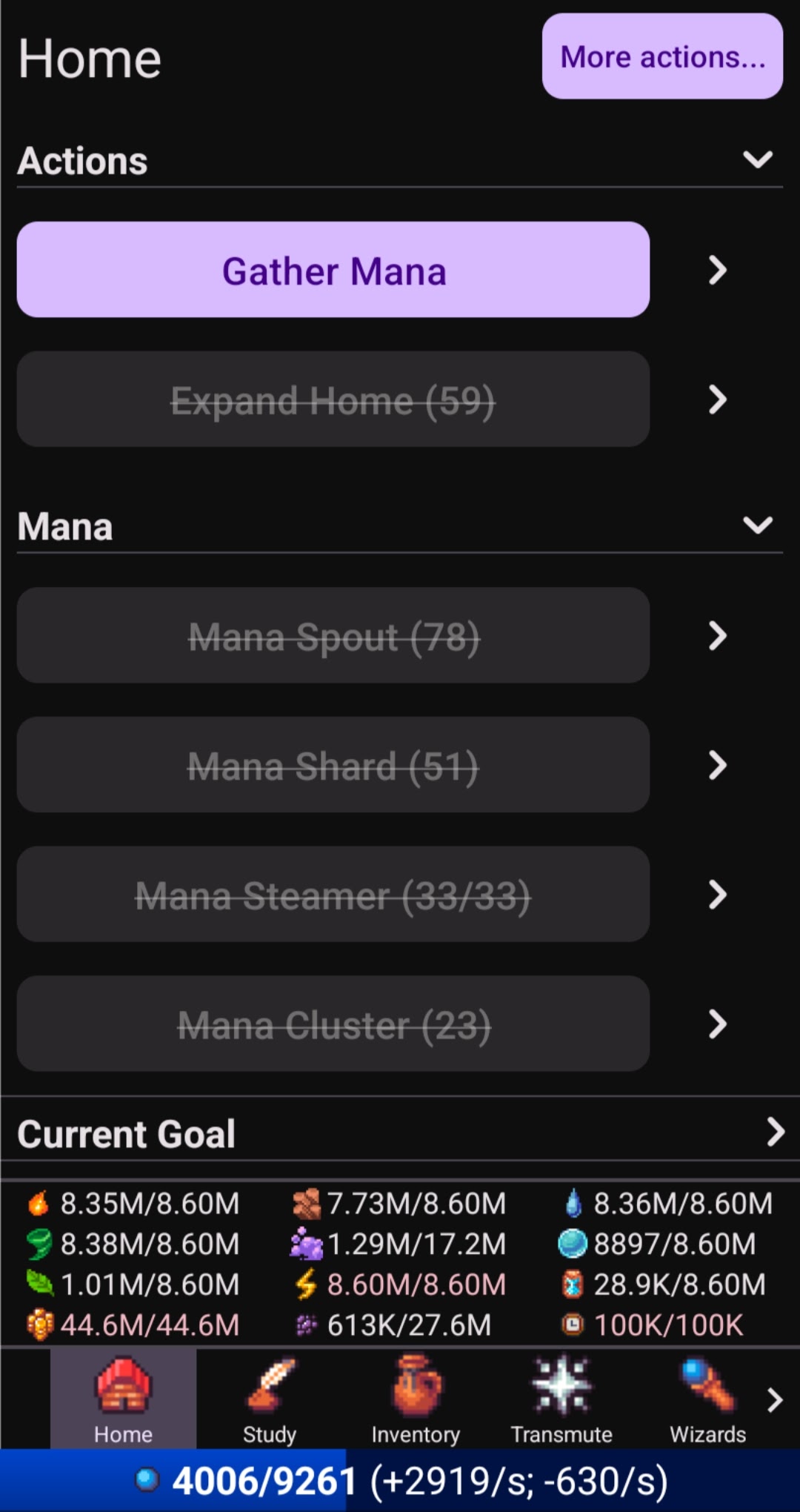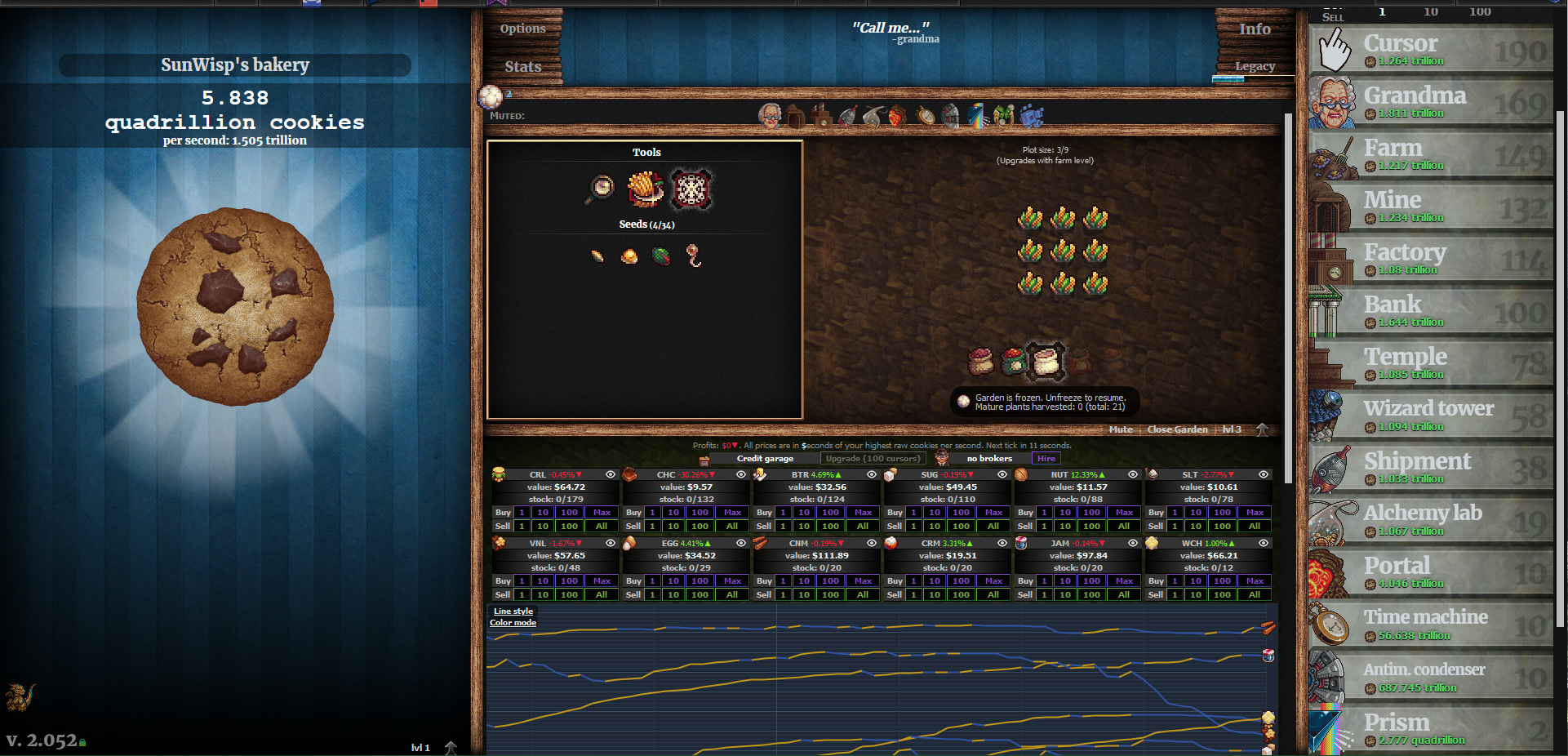An idle game is one you don't have to play. It runs in the background, continuing to progress while you are away. Many mobile games include some element of idle play. The classic idle games are also incremental games. An incremental mechanism includes exponential progression that matches exponential cost for achieving progression. For instance, if you're earning 1 widget per second you can save up 100 widgets to double your widget production. Why? So you can save up 1,000 widgets to double your production again. The numbers just keep growing. I realized that, unconsciously, I've gotten really into incremental games like this lately.
It started with my playing Minecraft with the mod Project E (a remake of the mod Equivalent Exchange). I touch on it briefly in this blog post. You gather materials, turn them into EMC, turn that EMC into more materials, and use those materials to create machines that create more materials or EMC. In the mudpack that I was playing, called Project Architect 2, there is a sort of end goal after which your material and EMC production becomes irrelevant.

I also got really into an amazing idle game for android called Magic Research 2. This game has some of the best mathematical and gameplay depth I've ever seen in an incremental game. Instead of just maximizing the production of a single resources, with some other resources contributing on the side, your economy is more complex. You maximize your mana production, but that only has value in your ability to cast spells. Some of the spells create elemental essences which can be used to construct buildings which improve various aspects of your economy: mana production, mana to essence conversion rates, storage sizes, research rates, automation ability. There's also a really compelling combat component. Your progress in the combat hardlocks your progress in other areas, so you can't entirely outlevel the competition and breeze through it. It has unique spells, familiars, spellcrafting, economy management, equipment and upgrades, research, and a bunch of features I'm sure I haven't even unlocked yet. It's an amazing game, but I did burn out of it after a couple of weeks of very intense play. I'm sure I'll come back to it later.
Most recently I've been playing what I consider the ultimate original: Cookie Clicker. I'm sure nostalgia plays a part, but there's also something charming about it's mechanics. It is more idle than either of the previously listed games, but also allows you to customize your strategy to be more active. It's all about making more cookies so you can make more cookies later on. The end goal? Make more cookies. There's no story like Magic Research 2, no external components of building or adventuring like Project E Minecraft. Part of the appeal is the scale. You've got to spend days on one run just to reset (ascend) and start all over with bonuses to your run allowing you to get farther. There are minigames like choosing passive effects for your pantheon, unlocking and cultivating various plants in the garden, and bartering on the stock market. It feels more classically strategic as you try to optimize for your particular goals. In Magic Research 2 I've found that any strategy will get you to the point where exploration is what's holding you back, and then you need to find the one strategy designed to beat the next boss. I've been playing cookie clicker for 25 days, according to in-game stats, and I'm nowhere near the mid-game.
So what's the appeal of these games? Why improve production only to afford further improvements in production? Part of it certainly is the gameplay elements you can control. You're going to get to the next stage of production eventually - the numbers keep going up regardless of the choices you make - but you want to do it quickly! But I think a bigger part is the illusion of progress. It's that dopamine hit of reaching a goal without losing sight of the next one. The goals you set are close enough together and, like I said, inevitable, that you really feel like you're doing something meaningful. You aren't. It's still fun.

What it reminds me most of is my attitude when I'm most healthy about exercising. I recognize that I'm not doing a lot now, but that what I'm doing will enable me to do more exercise later, and that will compound on itself until I get into great shape. Now, that never actually happens, presumably for the same reason I give up on incremental idle games, but still. It's like there's some connection in my brain's software that connects the impressiveness of exponential growth to satisfaction and motivation. Frankly, I think it's something to be cultivated, not laughed at or shamed because it's associated with a videogame genre that's basically designed to waste time.
If we can cultivate this attitude, we can motivate ourselves to take the long view on our goals. We can recognize how small steps at the beginning of a journey to learn a new skill or develop an attribute are meaningful. There might also be a lesson in there about restarting your quest after you've turned astray. In most incremental games, the progression is extended by allowing you to reset all or most of your achievements in return for some kind of bonus. It's expected that you'll have to do this multiple times to reach higher success. For instance, in Cookie Clicker right now I've just reset my progress so I lose all cookie production, but I gain a passive boost that more than doubles the cookies that my buildings produce this run. This means that buildings and upgrades that would have taken me days to save up for before can be attained in a matter of hours. In real life, once you've developed a skill, knowledge, or physical state, it becomes easier to return to. Your body and mind more quickly recall how they operated before that development regressed.
I guess, in the end, it's just a spin on the classic truth that positive attitudes can meaningfully impact your chances of success. It's a framing of that adage that works for me at the moment. Thanks for reading to the end of my blog post.
Sincerely,
SunWisp